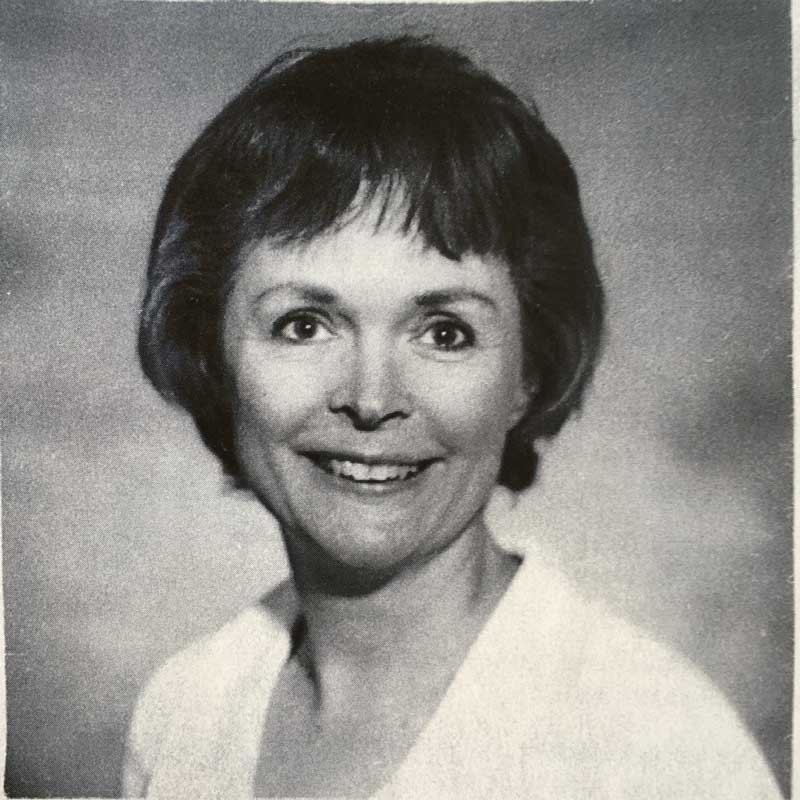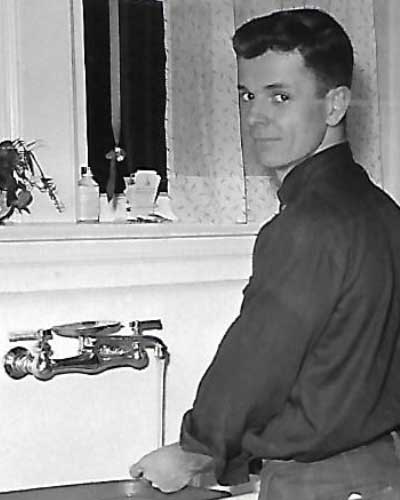At the risk of revealing more of myself than of my subjects, let me share what I remember about my parents. And rather than recount events, I'd like to draw a picture, as it were, letting their reputed worth do for words.
I'm about 15, and Mum is at the sink as I'm passing through the kitchen. She stops me and asks, "Do you know what those Kotex are for in the bathroom upstairs?" Stunned, I answer a quiet "Yes." (Toto Ruggierello, my Sicilian friend, had provided complete and, it turned out, surprisingly accurate, explanations of these mysteries about seven years earlier.) "Oh," she said. "I just wanted to be sure you respected those things." End of conversation. That was as complete an All-You-Need-to-Know-and-Were-Afraid-to-Ask course as she could bring herself to teach. And what stays with me most about this is not sex but the sink. To this day, when I'm at my sink, I feel myself wishing she could have thrown the garbage down a disposal or used a plastic scrubbing pad instead of steel wool or could have microwaved a pasta mix for dinner.
Her privacy was deep. We practically never saw her in slip; for her, being up meant being dressed, being presentable, and being there for us. She showed interest in everything we kids said. Did she resent being mobbed by the ten of us? You'd think so. Munner (what we called her mother) once said that when their family first moved to Detroit, Mum had said, "Oh good. I'd really like to meet the Ford girls." Instead, she married the equivalent of an Irish mafia don and lived like a princess in exile. True, she and Daddy would take trips to Chicago without the kids, and it was evident to me even then that she relished these times with him. But usually she spent evenings sitting at the kitchen table, smoking her Camels -- the brand she shared with Daddy at the time he quit -- and reading the paper, or War and Peace. On the other hand, she carried a kind of easy resolve to welcome the life she was given and not grouse that she was born at a wrong time.
Which brings to mind the sight of her with a hankie on her head stopping into Gesu Church in the middle of the day for a 5-minute visit. She once told me a story about a man with a broken leg who hobbled into church for a visit each day. The priest noticed this and, stopping the man, congratulated him for making the effort. In the course of their conversation, the priest asked the man what he says when he prays -- the Our Father? the Rosary? The man answered, "All I say is 'God! -- Leg!'" I think Mother said something like "God --- Yes."
Daddy was a giant to me. This man played pro baseball for three years -- until his mother told him to grow up, come home, and marry the nice girl who moved in down the street. (This he did, thank God.) He bought old hotels and sold them for profit. He had more bowling and golfing trophies that I could count. He built a darkroom and developed his own pictures. He made efforts to learn the names of trees and medical terms. He was indicted for bribery and, although acquitted, was evasive enough around our questions of his real guilt to let us draw our own conclusions. He said "damn" and "hell" at the dining room table -- something he would not tolerate in us. Unlike Dagwood, whose boss was Mr. Dithers, Daddy was the boss -- the man everyone on welfare depended on. He took up an interest in classical music when "high-fidelity" records became the rage. Of course there was his "black belt." A spanking with that was the ultimate sanction in our house after we had exasperated our mother's patience --"ultimate" not because of the pain but because we had displeased his dearest love.
I deeply believe he was proud of all of us, even though we'd sometimes hear, "Ed, Tad, Mike. . . (whoever you are) . . . Stop that!" There were clearly too many of us to receive the individual attention that we expect of good parents today. Perhaps Daddy's delight in us, which was always evident, was partly his surprise over what nature accomplishes without much help.
He and mother possessed a deep faith. Although it was supported by the practices of the day, their faith was in God, not the practices. It enabled us, their kids, to journey from the moral certainties of fundamentalist Catholicism to a healthy disrespect for law and a sense of humor about God. They bridged the gap between Munner's warnings about putting nickels in our mouths "because a Nigger might have had it," to Daddy receiving an honorary NAACP membership.
I don't think it would have surprised or even disappointed them that their children would not avoid divorce, would never again say the rosary, would laugh at the rules against birth control, would perhaps die in some awful accident, would have cancer, would, in short, take our world as it comes to us just as bravely and uncertainly, as they did theirs.
Faith, to me, is the knowledge borne of love. It's the reasons of the heart that the mind cannot understand. It's not factual knowledge. It's an eye for what's really good. Daddy's faith saw a gem in Mother, and Mother's faith saw the same in him. Pearls of great price to each other, worth everything else. I could never sum up everything their lives meant, but there is one legacy, one gift, one power that we have inherited which I think is evident in all their kids. It's a readiness to sell everything, to make cuts with the past, when our faith shows us something or someone really good.

"God is not a magician on a stage creating something out of nothing, but is part of the audience relying on us to use our time here to produce miracles."


